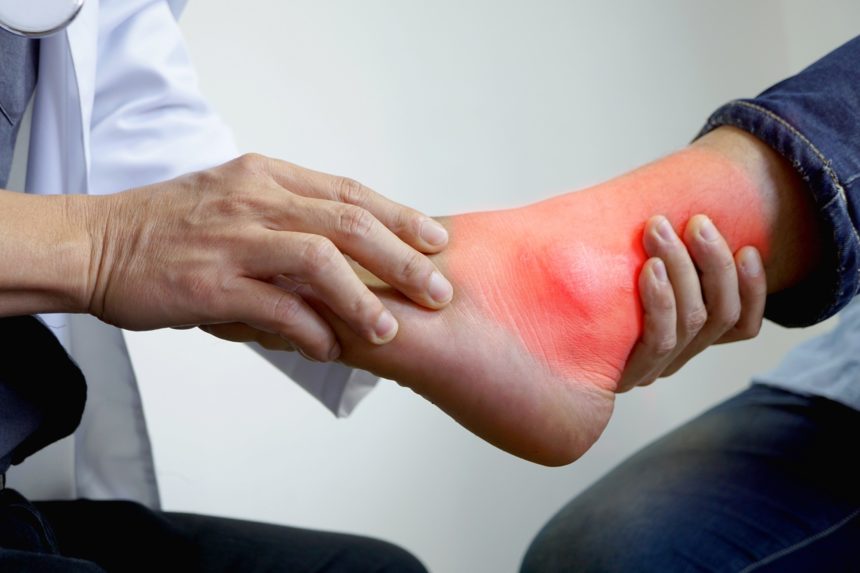What is gout?
Gout is an inflammation of the joints that results in crystallization of a chemical compound called “uric acid”. These crystals are attacked by the immune system, causing inflammation and pain. Gout can occur intermittently, with alternating periods of activity or inactivity. Gout attacks are defined as periods when the gout is active. They can be severe or long-lasting.
High levels of uric acids can cause gout. However, not everyone with high levels of the acid will develop the disease. Uric acid is created when the body degrades chemical compounds found in cells and some protein-rich foods. Uric acid is carried through the blood to the kidneys where it is excreted as urine. Small crystals can form in the joints if the blood concentration of uric acids is too high. This is because the body is producing too many or cannot eliminate it. These crystals can build up under the skin, forming hard lumps called tophus. The kidneys can also become clogged with uric acid crystals, which can cause kidney stones.
All information about Gout here: Gout Home Remedy.
Gout attacks can happen in any joint. However, the most common areas affected are the lower limbs (knees, ankles, and feet). Gout attacks usually begin at the base or big toe for many people: Gout Big Toe.
The first attack usually disappears within three to ten working days. However, if they aren’t treated promptly, they can return and continue for longer periods of time. A majority of people will experience a second attack within one year. Attacks can become more frequent, more severe, and more painful over time. Gout attacks that are repeated can lead to permanent joint damage. It is important to get treatment and diagnosis early.
Gout is a condition that can occur suddenly, unlike other forms of arthritis.The symptoms often begin at night, and then worsen over the next eight- to twelve hours. Gout can affect the foot, knee, ankle, and heel. Gout can cause persistent, intense pain and swelling that is not limited to the first affected joint.
You can buy home remedies here: Home Remedies for Gout.
How can gout be diagnosed?
Your doctor will first ask about your diet and recent medication before diagnosing gout. Your doctor will ask you about your symptoms, including when they started and how long they lasted. Also, what the severity was. Although elevated uric acids can be detected by a blood test, they do not always indicate a gout attack. You may be asked by your doctor to take further tests after you have experienced no symptoms. This is because uric acid levels can fall during an attack.
Gout can be diagnosed by placing a needle in the joint to collect fluid. However, a combination physical exam, blood tests, and imaging studies (Xrays or ultrasound) are often enough to diagnose accurately.
What are the lumps I am experiencing on my body?
Tophus are small bumps that can form from the buildup of uric acids crystals. These bumps may form anywhere on the body but they are most common on the feet, knees and heels. Although they are rarely painful, tophi can become inflamed and produce thick secretions. Tophi usually develop years after the first gout attack. However, they can sometimes become invasive and thicken over time. Tophi can be very irritating and need to be removed surgically.
What are the risks of gout?
Gout is directly linked to blood levels of uric acids. The risk factors for gout are mostly related to the excretion and production of uric Acid.
Diet: Consuming red meat, seafood (such as shrimp or oily fish), alcohol (especially beer), and sugar (especially the fructose in soft drinks) can all increase uric acid levels.
Hypertension: If you have high blood pressure, or take diuretics (diuretics), your chances of getting gout are higher. Even in low doses of aspirin, uric acid levels can be increased.
Obesity: People who weigh more than they should are are more likely to get gout. Gout incidence has nearly doubled over the past 20 years due to an increase in obesity.
Medication: Some medications inhibit the kidneys’ ability to excrete uric acid. Gout can be caused by diuretics or drugs that weaken your immune system.
Trauma and trauma: Gout can occur after an operation, heart attack or other traumas.
Kidney disease: Even mild cases of kidney disease can affect the ability to remove uric acid.
Gout can be passed down through the family. Many people who get gout don’t have a family history.
Gout Attacks: Dehydration may lead to dehydration.
What is the prevalence of gout?
Gout, which affects approximately 5.2% of adult Canadian men, is the most common type of inflammatory arthritis. Gout is only found in 2.4% of Canadian women. Gout is most common among people over 65.
What makes gout treatment so important?
Gout can become chronic if it is not treated. The presence of uric acids crystals around and in the joints can cause damage to the joint and soft tissues.
Treat Gout with Hondrostrong for a better treatment: Gout Natural Remedy.
Patients who receive the right treatment and care are less likely to develop advanced stages of the disease. People with chronic gout can manage the disease with medication. Lifestyle modification can also be an important part of treatment. It can help to prevent or manage other health issues that may arise from gout. Early treatment and diagnosis can help reduce the likelihood of permanent joint damage, as well as the severity and frequency of attacks.
